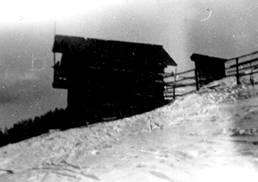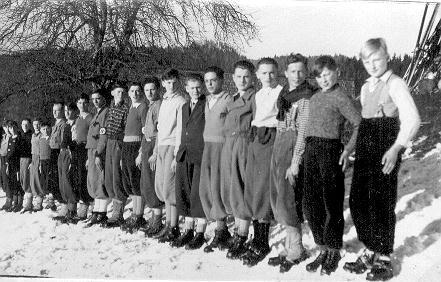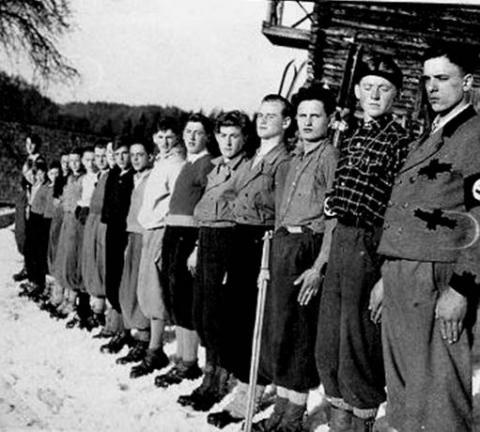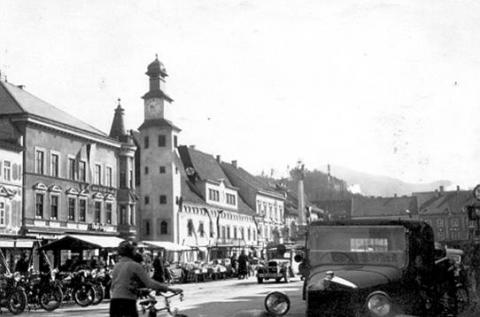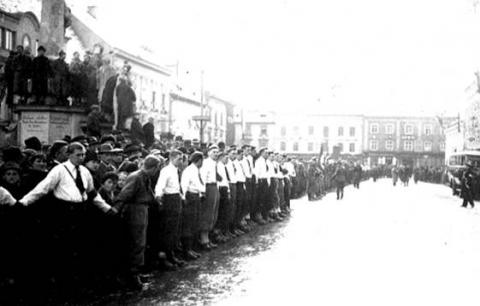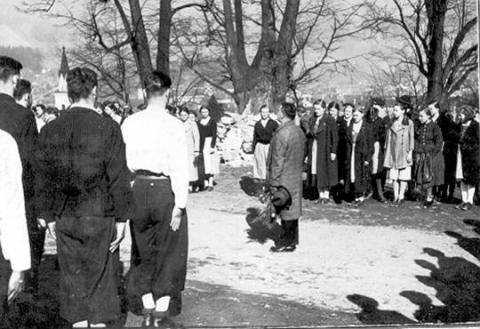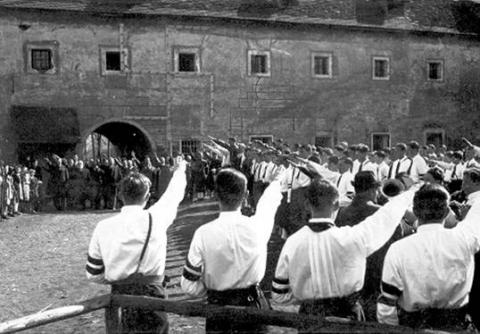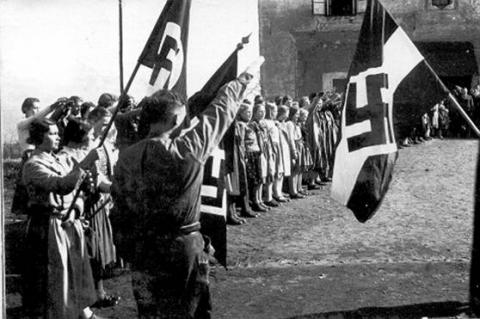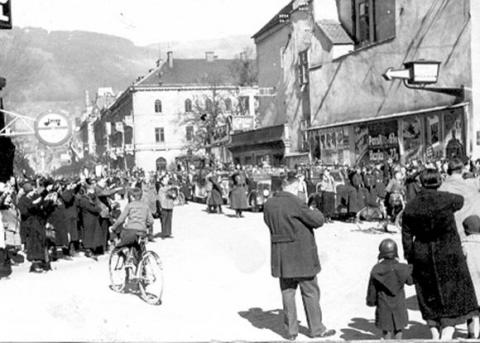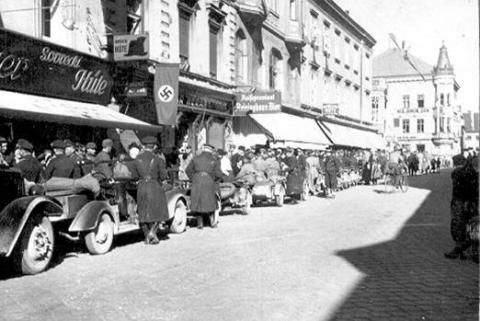The Days of Our Revolution
From Leopold Wenger's Trip Diary
The Days of Our Revolution
copyright 2013 Wilhelm Wenger and Carolyn Yeager
Translated from the German by Hasso Castrup
Following are the stirring events that took place in Leoben, Styria from February 12 through March 20, 1938, preparatory to the Anchluss (Austria becoming part of the German Reich) as recorded at the time by 16 year-old Hitler Youth member Leopold Wenger. Courtesy of Willy Wenger. -cy
12 February 1938 On our old campsite, at our cabin on Kraubatheck, there was for quite a long time already plans for a Hitler Youth camp again and it was scheduled to open this evening ... and as our term vacations were ending on 16 February, we were to spend four full days. Everything was already prepared and the food was already up there. I apologized that I could not come before Sunday because we had to sit in the police prison of Leoben and Wurschitz - 12 hours for a bicycle offense. (The fine was too expensive for us, therefore I had to endure the sentence). These 12 hours felt like an eternity. We were there together with all kinds of criminals: One of them told us that recently a Nazi was sitting there too, was then sent on to the district court but first he hid his revolver, cartridges and a swastika armband with the stamp of Donawitz in a wastebasket. One of the crooks found it and, with pleasure, handed it to the police.
Below: Our cabin in Schladnitzgraben; Right: Illegal Hitler Youth meet for skiing.
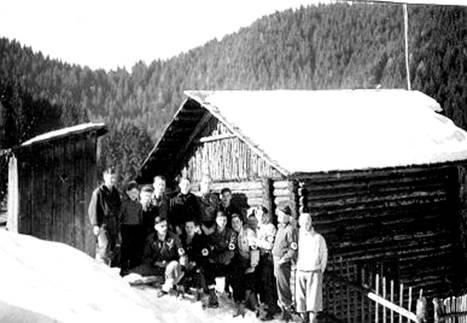
Group picture of Leoben illegal Hitler Youth, Feburary 1938
He asked me if I ever had anything to do with the police. Surprised, I denied it. Then he told me that our comrade Tiefental was brought to police HQ (hauled directly from his job) and interrogated by Major Zenz. He was shown a list, comprising all members of our [Hitler Youth] group in Leoben, including our group leader Marek. All the Scharführers, etc. were listed exactly. We were shocked. No one could imagine how the police got this information. That was the reason why the Hitler Youth camp had to be canceled immediately on account of the risk of a razzia [raid].13 February 1938: By chance we heard over the radio that Schuschnigg met with the Führer. We were very surprised by the humiliation, but did not get our hopes up because we did not want to be disappointed again. During the morning, some comrades were urgently looking for me. When I inquired in the afternoon what they wanted, I learned that I should have come to our hut.
14 February 1938: Early in the morning I took the train to Kaiserberg and went from there to our hut on Kraubatheck. My backpack was very heavy because it contained, besides the food, a brick. As we needed a new stove, everyone had to bring a brick. In the hut I found Ebner, Ebert, Klahr, Obermann and our camp cook. The day passed with skiing.
15 February 1938: I had apparently overeaten. I was not well, so I went home today. Earlier, Tiefental came by. He was sent from Leoben before midnight to fetch Ebner for a meeting with an associate of Scharführer, who had come from Graz. They came before dawn. Ebner with skis, but Tiefental still in his Sunday clothes; He looked great! I went home with the afternoon train. I was tired like a dog.
18 February 1938: At eight in the evening I had to go to a Führer roll call in Guenther Boehm's apartment. We were told that we should not expect anything from the meeting [of Hitler and Schuschnigg] in order not to be disappointed. Otherwise, our work goes on as before.
19 February 1938: At two o'clock in the afternoon I bade farewell to a group (under the command of Sepp Eberts) at the Dreihufeisenkreuz - they go with skis to the cabin of our group (Schar) in Schladnitzgraben. They took a swastika flag too. Then their leader, Walter, comes to me. He stands in front of me, pulls his right arm high and shouts: "Heil Hitler, everything is permitted again!" I told him he was crazy and asked if he could not shout louder. He is almost offended. Then we go to the main square. There are some German nationals with swastika flags there; otherwise only green-white and red-white-red flags are hanging. Then we see two men whom we knew had been locked up. Communists who were liberated by the amnesty are there, too. In the evening I meet Unterbannführer Ebner and ask him if I should not call Ebert with his group, who knows what may happen. But he tells me nothing will happen – I should let them stay in the camp.
Mom and Dad come in the evening with the little one (Gretl) from Graz (Dad was on leave). They say there will probably be a torchlight evening in Graz, with flags. The German travel agency is full of flowers, in revolutionary mood. In the evening edition of Tagespost it says: ... a hooligan fixed a swastika flag on the Town Hall, but it was then removed. In Graz, communists shot at the SA carrying flags. Some people were injured. In Leoben, it is the lull before the storm.
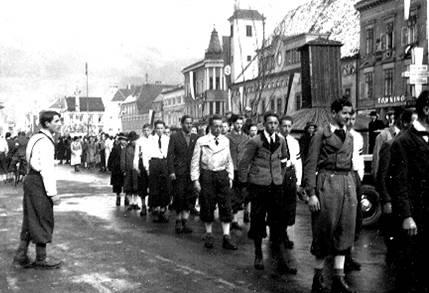
Poldi with his Hitlerjugend on main square, Leoben
The Town Hall of Leoben - calm before the storm
20 February 1938: Today is Sunday. We find out that the telephone offices are overloaded with calls. In the city all is still quiet. More or less. Towards noon the rumor appears: torchlight evening! I inquire if it's true. Yes, it is. At lunch there are already swastika flags in some windows. Everything is very excited, but in the city there is strange calm. Right after lunch I get the final command from our unit: "6 o'clock torchlight parade. The HJ gather at the corner Langgasse-Josef Grafgasse! Bring banners!"
I quickly send the messengers. Everything goes like clockwork. That reminds me of Ebert - naturally they will not come back until after dark. But that would be too late. Guenther Böhm was in the camp already this morning; now he goes again by bicycle, which he had adorned with a swastika pennant, to the Schladnitzgraben.
Meanwhile the city came alive. All have heard the Führer on the radio talking in the Reichstag. Everyone is delighted. On the streets you can see boys and men running. Everything is moving. Guenther Böhm is already back. He informs me that Ebert with the boys are already marching back. During the whole of Sunday they had the swastika flag hoisted. At 5 o'clock Ebert has still not arrived, so I'm going to meet him. I meet all the camaraderie behind Gör. One has the swastika flag on a ski stick as they ride down the mountain on skis towards me.
When we came back to the city, even the whole square was full of expectant people. Many brought the torches. Before dusk it's impossible to procure a torch. Then it was 6 o'clock. All the streets were full of people, not a policeman to be seen far and wide. We gathered in the Langgasse, the HJ from Donawitz were already there. Not one was missing of my flock, all 30 boys, some barely 14 years old. Also a long column of BDM [Bund Deutsche Mädel] girls were ready. Then the order was given: The leaders march in the middle of their unit so the orders will come from the middle, not from the front. Then we got the torches and it started.
As we reached near the main square, the vortex formed there. In Timmerdorfergasse we got stuck and had to wait to join the endless columns of marching units of the SS, SA, PO, civilians and the Women's League.
Behind us marched BDM and Jungvolk, then the SA units with their old storm flags, the sight of which made our hearts beat faster. We marched and sang and cheered through the main square, in the direction to Donawitz. The streets were lined with mostly women and soldiers who cheered us so much that it is impossible to describe.
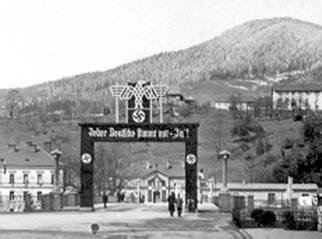
In front of the Waasenbrücke (railway bridge) in Leoben [this picture taken at the time of the April 10 plebiscite].
At the Waasenbrücke we saw a policeman on duty. We called at him, but he did not move. Then we passed the Jewish shops. There we sang the Song of the Storm Soldier (Lied vom Sturmsoldaten) and shouted "Judas perish! Heil Hitler! Who is our leader? Adolf Hitler" and so on until we were hoarse and could shout no more. In Donawitz I saw some of our high school professors shouting “Heil Hitler;” it was a joy. Then we marched back to Leoben, this time the HJ (Hitler Jugend) and DJ (Das Jugendvolk) alone. At the barracks we stopped, we approached the front of the barracks and sang. "In the East, a new day has begun to glow ... We are sons of the Ostmark, our country, the beautiful, our struggle and the victory!" The soldiers opened the windows, but they dared not sing with us yet.
Then we marched to the floodplains on the Jahn-meadow, formed a large, open square, on one side of which all the flags were displayed. Then the leaders inspected their units because during the march many boys whom we didn't know joined us. Then Unterbannführer Ebner made a report. It was the most beautiful ceremony I had ever seen. Ebner spoke to us of the importance of this moment and that our fight was not yet over, but that we only now were entering the decisive phase in the history of Ostmark, and called us again to prepare ourselves for the decisive battle. With Deutschlands and Horst-Wessel-Lied and the Song of the Youth the celebration came to an end. Then we were handed over the flags for safekeeping. These were a little small for our current criteria, but for us they were a symbol. Through deserted streets, late in the night, we went home. An eventful, beautiful day was over.
21 February 1938: When I came to school, people were greeting everywhere with the Nazi salute. Prof. Schröckenfuchs could not teach, but ran around in the classroom and ordered us to read aloud from the book "3 times Austria."
I later learned that in Kallwang he got a spanking from the local Hitler Youth under the leadership of Kaiblinger as he tried to provoke with the VF (Patriotic Front). In the afternoon I learned that in Trofaiach a torchlight march was to start and on this occasion a whole unit of SA (Unit 13) was marching there. I told this to the unit leader Marek and made the proposal that HJ go to Trofaiach on bicycles. That's what we did. Everybody who had time agreed and off we went.
Meantime my flag got a nice pointed end with swastika of sparkling brass. This item was crafted in the afternoon in dad's workshop by the workers; everyone was feeling the enthusiasm. Wherever we passed we were greeted by the residents.
Just before Troiafach we passed the 13th SA Unit, whose men also welcomed us warmly and enthusiastically. There we dismounted the bicycles and joined the Hitler Youth from Donawitz. We marched together in Trofaiach and then began a torchlight procession. Along the roadside there were hardly any people, for the entire population marched with us. On the main square there was a speech and then we rode back home. We had flags on our bikes. As we walked in the Donawitzerstraße, a few Communists taunted us, but when we stopped they quickly disappeared. Late in the evening I came home dead tired.
22 February 1938: In the morning at the school we were told that we were forbidden to salute with the Hitler salute, to shout Sieg Heil or to wear the swastika. But we cared very little about these bans. We not only wore these badges, but we made them ourselves. We already had great practice in it. We gathered five penny pieces, wherever we could find them; we honed them square, polished and sawed with a hacksaw the contours of the swastika. A pin was bent into shape and soldered on, and the badge was ready. I then let them sell through my boys so we got a bit of money for our common fund. At 8 o'clock in the evening was a planned Führer roll call at Seidler Emil's apartment. At 7 o'clock in the main square began a strolling demonstration against Schröckenfuchs, Gorbach, Pichler etc. Large posters read: "Down with the German-haters Schrockenfuchs, etc." I had left the demonstration earlier to go to the roll call. Here we got new guidelines from the Unterbannführer Ebner and the liaison to the division in Graz, Seidler. A members barrier for the HJ was imposed and only HJ aspirant groups could be formed. In view of the perilous times, we were allowed to carry weapons (only the leaders). 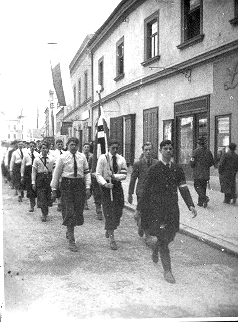
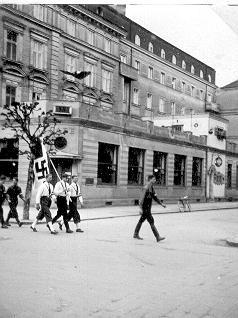
Above: Marek leads the Hitler Jugend past the Grand Hotel and along the street.
23 February 1938: At noon Gefolgschaftsführer Marek called me to his apartment. He handed me a heavy Walther automatic pistol (9 shots) and 90 rounds of ammunition. Then he told me about the gun and its use. For the evening he scheduled two Horst Wessel celebrations: the first at 6 o'clock for 15 younger comrades and the second celebration should start at 8 o'clock. For this purpose we had guarded all roads during the entire ceremony (The celebrations took place in the woods above the hunting house) – so we were protected from any insidious attack as had indeed occurred repeatedly. Both celebrations were well prepared and were not without effect on the boys. I spoke briefly about the life and death of our freedom heroes and I ended with a call to emulate our models. All were enthusiastic and sang the song of our dead heroes.
24 February 1938: At 8 o'clock in the evening a Führers' roll call at Günther Böhm. At the same time Schuschnigg begins to speak from Innsbruck. When I get home, I hear Schuschnigg call: "Men - it's time!" We are to vote, and that on the13th of March – we are all greatly outraged.
25 February 1938: Our dear VF took the speech of Schuschnigg as the occasion to hold a rally at the main square. Leoben has always been a hot spot, so the police from the whole of Upper Styria came to the town and were billeted in the youth center (Major Fey home) in Gaswerksstraße. If you went onto the street, every fifty meters you met police sentries with fixed bayonets and helmets. Then, in the evening the Fatherland Front (VF) marched. In the early afternoon, the main square was cordoned off. The HJ had opened its first office in “paradise hall” of the Hotel Post. The entire hotel was the headquarters of the party, district leadership, SA Brigade, SA Standarte – it was all here together. In the corridors, SA men in uniform stood on guard. During the day there was already high tension in Leoben and everyone felt that today it might be discharged.
And that's what happened. From all over the Upper Styria our SA had gathered here and already before dark the main square was completely filled by the Nazis before the half (in front of the City Hall) was cleared by the police and cordoned off. Then began the parade of VF or rather of organized KP [Communist Party]. The result was that half the square was filled with VF, the other with our people. In between were the gendarmes. Then some HJ leaders, including myself, got an order to look for a car with a certain registration number. We have been told that it would have a machine gun installed in a headlight. We got a lot of other reconnaissance. In the meantime, the whole HJ of Leoben and HJ Donawitz led by Toni Bauerfeind had placed themselves between the marching columns of VF, shouting "Heil Schuschnigg." No sooner than they were among the blacks, they started to sing, unfurl the swastika banners and their shouts changed. It became clear that these boys had a tough time with the black-red band – torches were thrown in their face, women beat them with chains. They were insulted and spat upon with wild shouts. The black-reds wanted to snatch their flag, but Bauerfeind himself held it firmly in his hand. He dealt a couple of hits so that no one dared to touch it. This went on until the rally was over and the national anthem was played. Of course, all sang the Deutschlandslied and instead of the VF-youth song (your boys close the ranks well …), the Horst Wessel song.
Crowds are filling the main square
However, the HJ was hit hard. Some were beaten and wounded. They had been hit in the head with chains or kicked in the abdomen. Two, Richter and Milchrahm, our inspection service dragged from the inn "Vienna" where they were put temporarily, through the main square to the Hotel Post. We then had to make patrols throughout the city, armed with a pistol, until 2 o'clock in the morning.
26 February 1938: In the morning there was of course school, in the afternoon I marched with a few boys in my troop to our cabin in Schladnitzgraben to prepare everything for the big downhill run and the patrol run. Evening, Gefolgschaftsführer Marek came to us. It was a fine evening, except the oven was smoking heavily.
27 February 1938: The day began as usual with morning exercise, etc. Then all participants arrived successively. My troop was almost complete (with 16 men). Maschek was represented by only 6 and Göß (Geisendörfer) was completely absent. The day passed with downhill skiing and patrol run where my troop took the first places everywhere. For that we were awarded the first HJ-flag.
28 February 1938: Start of the ski week in Leobner Gymnasium. I am the ski instructor in the 2nd Class.
1 March 1938: morning ski lessons in the lowlands. 20 o'clock roll call of camaraderie (Günther Böhm).
2 March 1938: Morning the ski course on Massenburg, 17 o'clock roll call of camaraderie 2 (Sepp Ebert) in our apartment. 20 o'clock roll call of camaraderie (Blasl Bertl) in his room at Liftl.
3 March 1938: Because of rainfall the ski course was called off. 20 o'clock and 20 o'clock 30 two appeals by two camaraderies.
4 March 1938: We got a stack of Führer pictures from Graz and sold them all. I alerted my troop and in the afternoon almost all the pictures were sold. Although this was forbidden by the police.
5 March 1938: New pictures had to be sold. Since Unterbannführer Ebner had to leave for a camp, I had to conduct the entire sale for Leoben. Shortly before, the Hotel Post had a house search - but here they found nothing.
6 March 1938: 3 o'clock afternoon a roll call. Over the week, I had 10 roll calls.
History Professor Peintinger speaks to us on the Massenburg
Above: Ceremony held at the Massenburg in Leoben by the Hitler Jugend, in March 1938
Girl's unit of the Hitler Youth, Bund Deutscher Mädel, participate too.
8 March 1938: In the evening I held a Führer roll call. On the way home I heard screams, "One, two, three! Down with Hitlerism", "red-white-red, Hitler dead", etc. VF [Vaterlaendische Front - Schuschnigg's Party] wanted to demonstrate. Gendarmerie stood in front of the Hotel Post. In a moment, everybody was out of the hotel. The policemen wanted to reassure us and said "do not provoke, let the KP [Komunistische Partei] scream all they want!" I made an astonished expression and asked where were the KP. The policeman pointed to the VF and replied: "That is no different than the organized KP." The other policeman agreed with him. Obviously, this is a new inspiration for the raging storm troopers around. And as the Blacks [the clerical party linked to the Catholic Church] were screaming on, the fight began. In Krottendorfergasse they were attacked from two sides and beaten so long that the SA Brigade Commander, Wolf Bauer, came running and gave the order to stop. The Blacks felt lucky to be able to break away with bleeding skulls.
11 March 1938:[Leoben] Trucks continuously drove through the city and dropped leaflets: "Vote for Schuschnigg," etc. But as soon as they lay on the ground, the HJ [Hitler Jugend] picked up the papers and threw them in the river Mur. This lasted all day. Also aircraft threw off leaflets and everybody was in a boundless rage. To make matters worse, the people's militia was armed, marched out and by 3 o'clock afternoon all public buildings (post office, train station, district court, etc.) were occupied by these scoundrels. But their dream did not last long. By 5 o'clock I met Mr. Ebner of the DAF [Deutsche Arbeiter Front] who called out to me: "The vote is postponed, tell everybody to fly flags at all houses."
That was good news! I ran straight to the HJ office, which was in Vorderbergerstraße for some time. Here I was ordered: "Tonight a great torchlight procession, venue Josef Grafengasse. Alert everybody!” And then it started. The whole square was full of people. We all got the “rubber sausages“ - just in case. The first time we went with our troop flag. We marched with lighted torches on the main square in front of the Town Hall to the rally. The whole place was full. Under the Town Hall balcony [Austrian] SS stood with helmets and flags. All around stood gendarmerie with bayonets.
Then, from the balcony spoke the chief of staff of the SA Brigade, Steindl. As he shouted down, "German troops have crossed the border and stand in Austria," everywhere sounded a joy, as you can hear it only once. Then he set all our opponents free to leave the city immediately and insisted that no blood should be shed. Afterwards the illegal Kreisleiter Kristandl spoke. Then the columns marched towards Donawitz by where the cinema was (...)
As we were being dismissed, we still had to attend the Führer roll call where we received guidelines for the next days. Then, we strongly believed that in the course of the night the German troops would march into Leoben and we did not want to miss the occasion.
Even as the rally in the main square was going on, all gendarmes suddenly disappeared from the police station and when they came back again, they all had SS armbands. We could not believe it at first, and it seemed almost like living in a dream. Of course no troops could come so quickly. At this time they were not even in Salzburg, but I had really no desire to go to sleep. It started to rain and the crowds disappeared from the streets. I saw how the SA was being armed with the guns of the People's Militia. [PM was a Schuschnigg organization.] I was there at 1 o'clock [a.m.] as the House of VF, the Chamber of Labour, was occupied. By 3 o'clock in the morning Lieutenant Vinek got a swastika flag from Hotel Post and let her fly over the barracks. Only then I went to sleep.
12 March 1938: The home of the Austrian Jungvolk was occupied by the gendarmerie. It belonged to us. By 14 o'clock [2 pm] we occupied it, stuck up a sign that Dad had painted, NSDAP - HITLER JUGEND, and treated the police as our guests. In the evening we were called away from a meeting in order to requisition cars of known anti-Nazis. Massenburg was occupied by HJ.
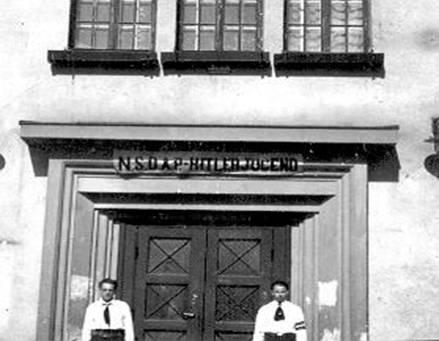
First Hitler Jugend home in Leoben
13 March 1938: In the afternoon all our followers marched to Tollinggraben where the big Jungvolk home was. It was occupied and I had to stay up with 5 men. Towards the evening an order came by the telephone that we should immediately come to Leoben, as we should be then moved to Graz; the Führer was in Graz, it said. When we were leaving, I could not help but to shoot a series at the big board of the home with my revolver.
In Leoben, we were loaded onto trucks the side planks of which almost burst. It was freezing cold. Of course the Führer was not in Graz. So we went back again. Since most were wearing only shirt and skirt, the girls who rode in buses loaned us their coats. Nevertheless, it was almost unbearable. At midnight, we arrived in Leoben and then we had night duty. During sentry duty the gendarmes loaned us their coats and helmets.
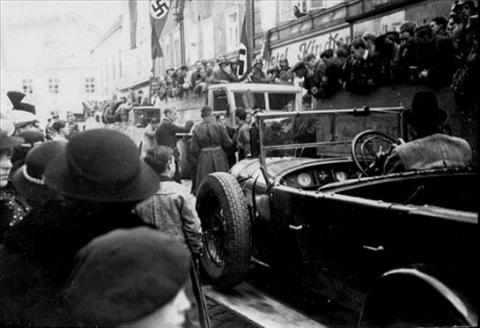
Ready to go to Graz
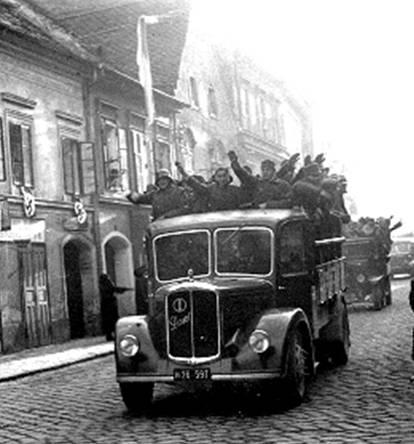
Enthusiastic departure for a rally in Graz which never took place
14 March 1938: The garrison troops were sworn in [to] the Führer. The first German police come to Leoben. In the morning my Dad led me to Bruck on the Mur. There, already the German military had come from Vienna.
German police troops welcomed by the population
German police seen in Leoben after March 13
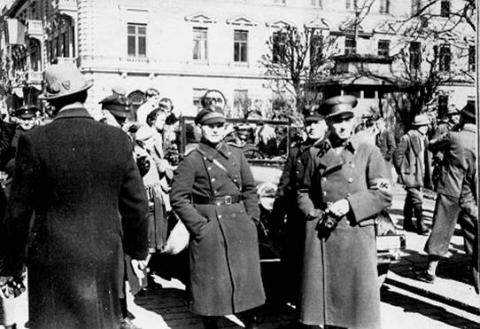 German (left) and Austrian police officers,now with swastika armbands, greet cordially
German (left) and Austrian police officers,now with swastika armbands, greet cordially
15 March 1938: Wieder and I had guard duty. Throughout the night.
16 March 1938: The service became more regular
17 March 1938: We needed uniforms, but we never could find them. In Bruck we got two brownshirts. Everything else was sold out. On the castle square at the Massenburg there was a brief celebration of the school under the new director Prof. Peintinger.
18 March 1938: the Bannführer of Styria was visiting Leoben.
20 March 1938: Finally the first German troops, already expected so much by the whole population, came to Leoben.
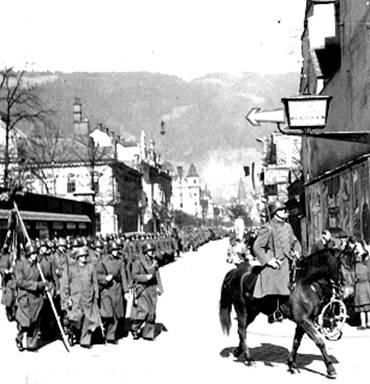 Above: The Federal army marches on the main square, Leoben
Above: The Federal army marches on the main square, Leoben
Category
Adolf Hitler, European History, Germany, Leopold Wenger, National Socialism- Printer-friendly version
- 6917 reads

